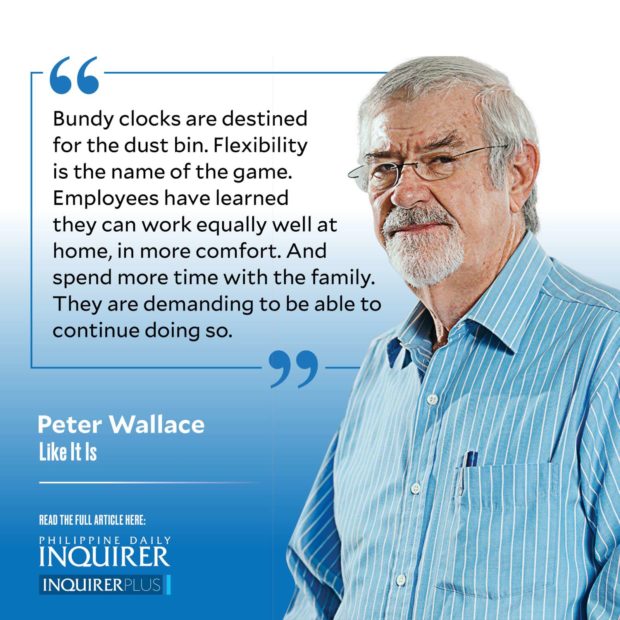It’s a hybrid world
The Fiscal Incentives Review Board (FIRB) has denied the earlier request of the Philippine Economic Zone Authority (Peza) to extend the 90-percent work-from-home (WFH) arrangement for IT-BPM companies until Sept. 12, 2022 if they wish to keep their fiscal incentives. The WFH scheme for IT-BPM is set to expire on March 31. This decision will require such companies to bring almost their entire workforce back to the office.
The law requires companies and their employees who are granted incentives to locate in an economic zone, but that law was written before WFH existed. COVID-19 forced WFH, and the FIRB agreed to allow it as an exemption to the law until December last year, later extended to March 31. But companies aren’t ready. They need more time, hence the Peza request.
With the war in Ukraine disrupting everything, and fuel prices going through the roof, the extension should be granted, even extended till year end.
But there’s a more fundamental reason to not just extend it but make it permanent, and that’s the “new normal.” The new normal is a hybrid world. Companies have found they get better performance and less cost with WFH. So companies, looking for a place to relocate their business processing operations, are going to choose countries that offer these lower costs. With US labor costs having doubled over the past few years, the incentive to relocate is even stronger.
If the Philippines is to remain a leader in the BPO sector, it is going to have to offer flexible working arrangements, as decided by the company, not the government, on a permanent basis. This will require a change in the law, which the next administration should rush. In the meantime, this administration should extend WFH for companies with incentives till year end, so the next one has time to change the law.
The only negative I see is that the city centers don’t get to revive back to their old glory. Restaurants, coffee shops, etc., don’t sufficiently recover and public transport doesn’t get the traffic they need to prosper. But, as I see it, this is an inevitability they are going to have to adapt to. We have moved into a hybrid world, there’ll be no going back.
Bundy clocks are destined for the dust bin. Flexibility is the name of the game. Employees have learned they can work equally well at home, in more comfort. And spend more time with the family. They are demanding to be able to continue doing so.
The global IT-BPM industry has grown rapidly due to COVID-19, and the subsequent recognition that this will now be permanent. For us to remain a primary choice as to where to locate, we must offer a hybrid world. Wise governments make decisions based on the likely future, not the now-gone past. Maybe Filipino employees don’t have yet the choice to demand flexibility, as the Western world does. But as the country strengthens, they will. The government shouldn’t wait. It should be ahead of the curve, setting conditions favorable to employees, not favorable to itself.
A survey by the IT and Business Process Association of the Philippines showed that an overwhelming 80 percent of employees prefer a hybrid model. A higher 90 percent say they are more productive. A US study found that productivity improved a dramatic 47 percent because of no time on the road, and an improved work-life balance. Worryingly, 60 percent say they’d likely consider resigning if the option to WFH is denied to them.
We’ve learned that geography is irrelevant. Zoom has taught us that, the full shift to a digital world is teaching us that. You base decision on action, not location. Anyway, allowing WFH will do exactly what the government wants to do, move industry to the provinces. Companies can employ a Filipino to work from Siargao (where they sure need a job) because they don’t have to travel to an office in Makati.
Why clog what will again become the hopelessly overcrowded roads of Manila and Cebu with commuters when you don’t have to? Especially now, when the price of gas and diesel has gone through the roof and supply may well become restricted. That higher cost of fuel comes out of the employee’s pocket. I work every day of my life, so I’ll often send work to my staff on a weekend. It’s up to them if they’ll do it or wait till Monday. Because they now work from home (all do), they do it. Our efficiency goes up.
Companies will have no choice but to go to where they can be most efficient. India, Malaysia, and Poland are all allowing more flexible work arrangements so we’ll lose our industry to them.
It’s a hybrid world, we must encompass it to succeed.

















